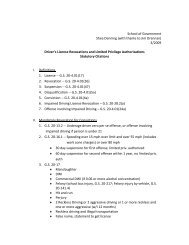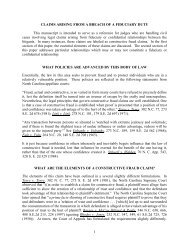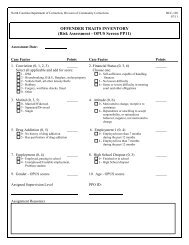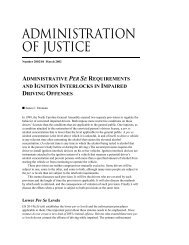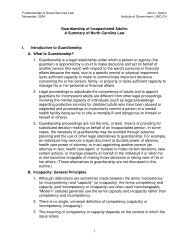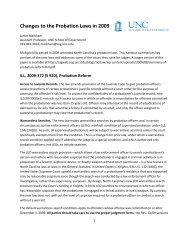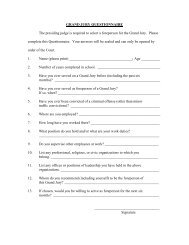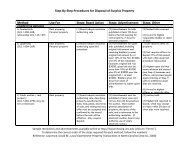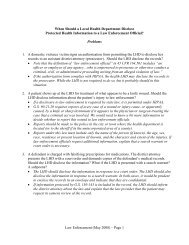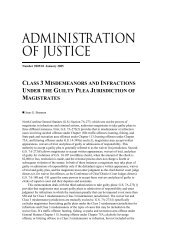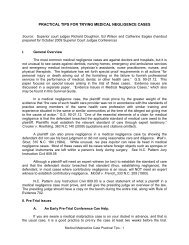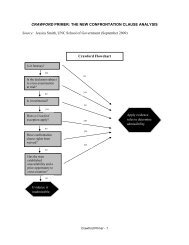Handout 1 - School of Government - University of North Carolina at ...
Handout 1 - School of Government - University of North Carolina at ...
Handout 1 - School of Government - University of North Carolina at ...
You also want an ePaper? Increase the reach of your titles
YUMPU automatically turns print PDFs into web optimized ePapers that Google loves.
• The trial court did not have subject m<strong>at</strong>ter jurisdiction because, in the underlying case in which DSS<br />
was awarded custody, no proper summons was ever issued because the summons was not signed by<br />
a clerk or assistant or deputy clerk.<br />
In re K.J.L., ___ N.C. App. ___, 670 S.E.2d 269 (12/16/08).<br />
http://www.aoc.st<strong>at</strong>e.nc.us/www/public/coa/opinions/2008/080284-2.htm<br />
Facts: Parents appealed from an order termin<strong>at</strong>ing their parental rights, arguing th<strong>at</strong> the trial court lacked<br />
subject m<strong>at</strong>ter jurisdiction.<br />
Held: Vac<strong>at</strong>ed.<br />
1. In the underlying neglect/dependency action, in which DSS obtained custody <strong>of</strong> the child, no<br />
summons was ever properly issued because the summons was not signed by a clerk or assistant or<br />
deputy clerk. Therefore the court lacked subject m<strong>at</strong>ter jurisdiction in the underlying case. [Although<br />
the opinion does not say this directly, because the order giving DSS custody was void for lack <strong>of</strong><br />
jurisdiction, DSS did not have standing to petition for termin<strong>at</strong>ion <strong>of</strong> parental rights.]<br />
2. [This holding was effectively overruled by In re J.T., above.] Although the summons in the<br />
termin<strong>at</strong>ion <strong>of</strong> parental rights case named the child in the caption, it was not served on or accepted by<br />
the child’s guardian ad litem. Therefore, following other recent opinions <strong>of</strong> the court, the trial court<br />
lacked subject m<strong>at</strong>ter jurisdiction.]<br />
UCCJEA<br />
• An order entered pursuant to temporary emergency jurisdiction under the UCCJEA remains in effect<br />
until an order is received from another st<strong>at</strong>e th<strong>at</strong> has jurisdiction.<br />
• N.C. became the child’s home st<strong>at</strong>e when the child and parent had been here more than six months<br />
and no action had been filed in another st<strong>at</strong>e.<br />
• Failure to serve one <strong>of</strong> the parents in the underlying juvenile case did not deprive the court <strong>of</strong> subject<br />
m<strong>at</strong>ter jurisdiction in a l<strong>at</strong>er termin<strong>at</strong>ion action.<br />
In re E.X.J., ___ N.C. App. ___, 662 S.E.2d 24 (6/17/08), affirmed per curiam, ___ N.C. ___, ___<br />
S.E.2d ___ (2/6/09).<br />
http://www.aoc.st<strong>at</strong>e.nc.us/www/public/coa/opinions/2008/071235-1.htm<br />
http://www.aoc.st<strong>at</strong>e.nc.us/www/public/sc/opinions/2009/pdf/341-08-1.pdf<br />
Facts: In April 2005, the day after arriving in N.C. from Alabama, respondent (mother) took her two<br />
children to DSS for placement in foster care, telling the social worker th<strong>at</strong> she was not mentally or<br />
financially able to care for them and had left Alabama to escape domestic violence and other marital<br />
problems. DSS filed a petition and obtained nonsecure custody. Respondent was served properly but the<br />
summons mailed to the f<strong>at</strong>her in Alabama was returned “unclaimed.” Notice <strong>of</strong> an August, 2005,<br />
adjudic<strong>at</strong>ion hearing was sent to the f<strong>at</strong>her, who wrote a letter to the clerk st<strong>at</strong>ing th<strong>at</strong> he could not <strong>at</strong>tend<br />
but had a good job and would have his own home soon. At the hearing the mother stipul<strong>at</strong>ed to facts<br />
rel<strong>at</strong>ing to dependency and the court adjudic<strong>at</strong>ed the children dependent and left them in DSS custody. At<br />
a permanency planning hearing in October, 2006, the court ceased reunific<strong>at</strong>ion efforts and changed the<br />
permanent plan to adoption. In December, 2006, DSS filed motions to termin<strong>at</strong>e the parents’ rights.<br />
Because the f<strong>at</strong>her had never been served in the dependency case, DSS in April, 2007, filed a petition to<br />
termin<strong>at</strong>e his rights and had a summons issued to him. Both parents were properly served. Both<br />
respondents moved to dismiss for lack <strong>of</strong> subject m<strong>at</strong>ter jurisdiction and the f<strong>at</strong>her also moved to dismiss<br />
for lack <strong>of</strong> personal jurisdiction because he was not served in the underlying case. The court denied the<br />
motions, heard evidence, and entered an order termin<strong>at</strong>ing both parents’ rights.<br />
Held: Affirmed.<br />
1. The court rejected respondents’ argument th<strong>at</strong> DSS lacked standing to petition for termin<strong>at</strong>ion<br />
because it was not granted custody by a court <strong>of</strong> competent jurisdiction.<br />
8



